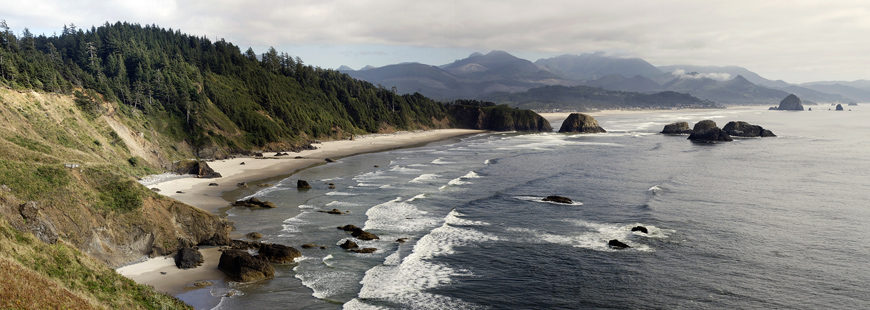Photo: Oregon coast, via Wikipedia
Just like a day on the water, if you pay attention, you can learn something every day, even stuck in a large meeting room full of representatives with diverse interests.
I attended the first (hopefully annual) Roadmap to the Outdoors Symposium sponsored by many great companies, agencies and organizations. It’s really dealing with a 21st century crisis: how to get more people invested in Oregon’s outdoors. There were many powerful speakers present, including Governor Kate Brown and former Secretary of the Interior Sally Jewell, all talking about a way for Oregonians to sustainably enjoy all that we have to offer in the best state of the union. Sure, call me biased as a life-long Oregonian.
Following an evening at the theater (yea, as if I’m cultured…) watching Part 2 of the production Astoria, I think the most profound speaker was Chairwoman Cheryle Kennedy of the Confederated Tribes of the Grand Ronde. As if the extensive history lesson in the play wasn’t enough on Valentine’s Day, I got another lesson in Native American culture at the symposium the day after. I’ve been at rallies before with members from various tribes, but like lessons learned on the water, it takes more than once to drill some valuable lessons into my pea-brain.
Some takeaways from the Chairwoman’s talk:
- Native Americans don’t think about just their children and grandchildren, they “manage” their natural resource for the next seven generations. On that note…
- Native Americans have lived in harmony with the fish and wildlife of the Pacific Northwest – salmon, big game, water, roots and berries have sustained their people – for 10,000 years. We’ve managed to plunder these same resources in just 200 years.
- I can no longer speak with pride the fact that I’m a sixth generation Oregonian, since Chuck Sams of the Confederated Tribes of the Umatilla is a 500th generation Oregonian. All of a sudden I don’t have any street credibility.
- Most tribal folks don’t use PowerPoint presentations or speak from their notes. They draw their words from the heart, and it comes across more authentically than any words I can put to paper.
It was a pretty inspiring day, bringing together a cross-culture of people with one collective goal: creating the next generation of conservationists so Oregonians from all walks of life have an opportunity to enjoy the natural resource treasures that many of us have experienced in our lifetimes. I can’t tell you how many people I’ve come across who have told me about the fishing they enjoyed in the good ol’ days. I know you have too.
Most of us realize we may never see the good ol’ days again, but we’ve learned from our mistakes. As I’ve written about before, we’ve gone through the decline of halibut, salmon, steelhead, bottomfish, trout and crab, but managers have done a good job of rebounding these resources before they reached critically low levels. Will the East Coast ever see a rebound of their historic Atlantic salmon runs? Probably not. We still have something to fight for here on the Pacific Coast, and hopefully have learned from the lessons from the east side of the country.
Well, maybe not all have learned these lessons. There are still some bad bills, such as H.R. 200 and S. 1520, the Modern Fish Act, navigating through Congress. These bills prioritize the economics of the resource for the short-term and compromise the rebuilding of fish stocks, as in red snapper in the Gulf. It’s easy to dismiss this as a Gulf Coast initiative that really doesn’t have a lot to do with us here on the West Coast, but federal law is federal law. Any amendments to the Magnuson-Stevens Act must be carefully vetted and well thought out, especially since the current version of MSA has brought U.S. fisheries back from the brink of perpetual rock-bottom in just 20 years.
Every previous reauthorization of the MSA, as a matter of fact, has been a bi-partisan effort. Has politics in our country changed so much that a bi-partisan effort is just no longer an option? It doesn’t matter if you’re a Democrat, Republican or Independent, our coastal communities and sport and commercial fishermen deserve a future, and even seven generations later, they too deserve a future. Do we really want to be known as the generation that pushed us toward the world’s sixth great extinction? Count me out.
I look forward to getting out on my next fishing excursion. I’m particularly excited about bottomfishing again when the seas finally lie down. It might be wise for me to lay off my lucky streak for 2018. I’ve had a limit day of lingcod, sea bass and Dungeness crab, and a four-steelhead day on the Wilson so far. Why risk that good of a start?


